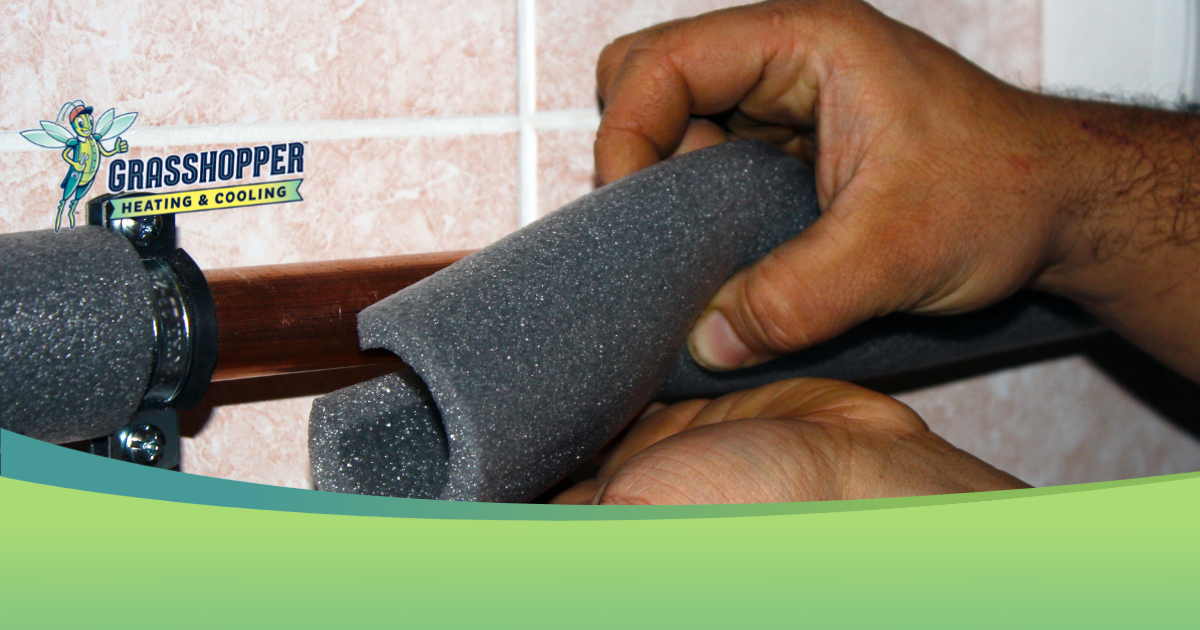When temperatures drop, your pipes are at risk of freezing, which can lead to costly water damage and major repairs. Taking the right precautions before winter sets in can help you avoid frozen or burst pipes and the headaches that come with them.
At Grasshopper Heating & Cooling, we want to help you keep your home safe from winter damage.
Insulate Your Pipes for Freeze Protection
One of the best ways to prevent frozen pipes is by adding insulation. When pipes are exposed to cold air, the water inside them can freeze and expand, increasing the risk of bursting. Insulating pipes in unheated areas, such as basements, attics, and crawl spaces, helps retain heat and prevent freezing.
Here are some effective insulation materials:
- Foam pipe wraps: These are easy to install and great for keeping pipes warm.
- Fiberglass insulation: This insulation works best for large pipes and extremely cold conditions.
- Heating tape: Convenient tape provides direct heat to pipes that are most at risk.
In addition to freeze protection, insulating your pipes improves energy efficiency by reducing heat loss.
Use Pipe Wraps To Prevent Freezing
Pipe wraps add an extra layer of insulation, helping to maintain warmth even in subzero conditions. They are especially useful for exposed pipes or those in unheated spaces.
Common types of pipe wraps include:
- Self-sealing foam wraps: They’re simple to apply and ideal for both indoor and outdoor pipes.
- Reflective insulation wraps: These wraps reflect heat back into the pipes.
- Rubber-based insulation: This insulation is flexible, moisture-resistant, and perfect for outdoor use.
Protect Outdoor Faucets From Freezing
Outdoor faucets are especially vulnerable to freezing since they are directly exposed to the elements. If water inside an outdoor faucet freezes, it can cause the connected pipe to burst.
To protect your outdoor faucets:
- Disconnect and drain garden hoses before winter.
- Install insulated faucet covers to shield them from the cold.
- Shut off the outdoor water supply and drain any remaining water.
Use Drip Prevention To Avoid Frozen Pipes
Letting your faucets drip slightly during freezing weather can keep your pipes from freezing. Moving water is less likely to freeze than stagnant water, reducing the risk of blockages and bursts.
Here’s how to use drip prevention effectively:
- Let faucets drip overnight when temperatures are at their lowest.
- Focus on pipes along exterior walls, as they are most vulnerable.
- Use both hot and cold water taps to keep the entire system moving.
Grasshopper Heating & Cooling Keeps Your Pipes Safe
Now that you know how to protect your pipes in freezing weather, you can take action to prevent damage before winter arrives. Insulation, pipe wraps, and drip prevention all play a key role in keeping your plumbing safe.
Grasshopper Heating & Cooling provides expert advice and solutions to protect your home’s plumbing throughout the winter. Our team specializes in heating, cooling, and home comfort services tailored to your needs.
If you need help protecting your pipes in freezing weather, call us at 518-545-3271.



